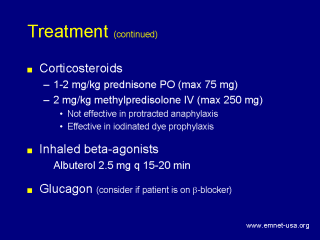| front |1 |2 |3 |4 |5 |6 |7 |8 |9 |10 |11 |12 |13 |14 |15 |16 |17 |18 |19 |20 |21 |22 |23 |24 |25 |26 |27 |28 |29 |30 |31 |32 |33 |34 |35 |36 |37 |38 |39 |40 |41 |42 |43 |44 |45 |review |
 |
Despite widespread use, the
efficacy of glucocorticosteroids in the treatment of anaphylaxis has not
been established. Clear efficacy has been established for steroid
pretreatment of radiocontrast media reactions. Glucocorticosteroids may also
prevent sustained bronchospasm that could be a component of anaphylaxis, and
they have been strongly advocated as mainstays of prevention of recurrent
idiopathic anaphylaxis. However, glucocorticosteroids that are administered acutely do not prevent mast cell mediator release. They do prevent tissue based late phase reactions by interfering with the recruitment and activation of eosinophils and neutrophils, neither of which appear to have significant roles in systemic anaphylaxis. The Stark and Sullivan report demonstrated that corticosteroids do not prevent protracted anaphylaxis. Finally, Khan and Yocum have reported that patients with idiopathic anaphylaxis who were treated prophylactically with high dose long-term corticosteroids and antihistamines had outcomes similar to those treated with antihistamines alone. Intravenous glucagon may reverse the hypotension of patients who have been treated with b -blockers and are unresponsive to epinephrine. |